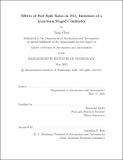Effects of Fuel Split Ratio on NOₓ Emissions of a Lean-burn Staged Combustor
Author(s)
Chen, Yang
DownloadThesis PDF (9.442Mb)
Advisor
Speth, Raymond
Terms of use
Metadata
Show full item recordAbstract
Aviation NOₓ emissions are a significant factor in causing air quality deterioration, leading to potentially 16,000 annual premature deaths globally. To cope with the expected increase in air traffic demand in the near future, aircraft-based lean-burn staged combustion becomes a promising solution in reducing NOₓ emissions. This thesis investigates the effects of a lean-burn staged combustor’s fuel split ratio and staging threshold on the NOₓ emissions for both a sea-level static scenario and a representative flight mission. NOₓ reduction benefits from optimizing the fuel split ratio are studied, and the EINOₓ performance between an RQL and a lean-burn staged combustor are compared. Chemical reactor networks, NPSS engine cycle models, and a TASOPT flight mission model are utilized. In comparison to previous studies, a wider range of pilot fuel fraction, from 16% to 100%, are tested over more refined thrust cases, from 0% to 100% rated thrust. A wider range of phases, including the cruise conditions in addition to the LTO cycle, is employed in this thesis. This thesis illustrates how a pilot fuel fraction below 30% is infeasible through the calibration of the combustor model. It is found that staging should occur as early as allowed by combustion stability to minimize NOₓ emissions, and the optimal fuel split ratio is roughly constant across different throttle conditions. Moreover, reducing the air distributed to the pilot zone decreases the overall EINOₓ level, and the lean-burn staged combustor is observed to outperform an RQL combustor in terms of NOₓ emissions.
Date issued
2022-05Department
Massachusetts Institute of Technology. Department of Aeronautics and AstronauticsPublisher
Massachusetts Institute of Technology